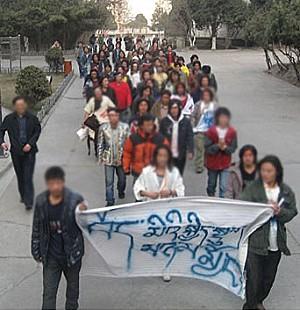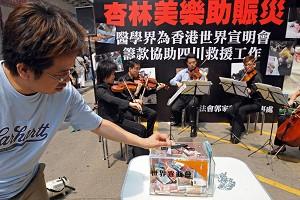WASHINGTON — The Chinese communist regime will be launching a two-month patriotic educational campaign in Tibet. The regime’s similar campaigns in the past achieved little success. Critics say that if Beijing does not seriously consider its policies toward Tibet, this new program would fail as well.
Ever since the unrest in Lhasa in mid-March, Chinese authorities have come down hard on Tibet and Tibetan settlements scattered throughout other provinces. Since then, no independent media has been allowed to enter Tibet for interviews or coverage of the recent crackdown. In the meantime, China has been closely monitoring information on Tibet.
State Media Avoids Discussing Errors in Tibetan Policies
China’s state-run media has avoided discussing much criticized errors in Beijing’s policies toward Tibet, such as violent interference and suppression of Tibetans’ freedom of religion. Instead, official media repeatedly bombards the public with comments of how the communist regime has offered Tibetans unprecedented opportunity. They also repeatedly state that the recent uprising was a plot sparked by the Dalai Lama, Tibet’s exiled spiritual leader, in his attempt to separate Tibet from China.
China’s official newspaper, the Tibet Daily, reported Monday that the Tibetan local regime’s two-month patriotic education campaign will be disseminated through TV programs and public educational gatherings. The local authorities intend to unite Tibetan thought, crackdown on thoughts of separating from China, strengthen the struggle against separatism, and fight against separatist plots—a movement that Chinese authorities say stem from the Dalai Lama and his cohorts.
However, the Dalai Lama has repeatedly stated that he has not sought separation from China, but genuine autonomy for Tibetans within the framework of the PRC.
Wang Lixiong: Loving China is Loving the Ruling Party
Wang Lixiong, a Chinese writer who has been expressing his concern over recent upheaval in Tibet, said that the kind of patriotism advocated by Chinese authorities features one obvious problem: in the official Chinese regime’s version of patriotism: loving one’s country equals loving the ruling party and regime. Those who dare to criticize the ruling party and regime will be labeled “traitors,” said Wang.
Just how likely is this new propaganda campaign work to meet the goals of the CCP? Wang said that the Chinese authorities have initiated uncountable patriotic educational campaigns in Tibet in past decades barely swaying public opinion, and more often producing negative results. Wang believes that there is no exception to this present campaign.
“I think those in charge of such a campaign should have been aware of this. In my opinion, the purpose of advocating such patriotism is not necessarily to ‘brainwash” or educate people. Instead, it is a way to involve everyone in the patriotic movement, during which Tibetans were supposedly subjected to Beijing’s authority.”
The most important part of China’s patriotic educational campaign in Tibet is to ask participants to publicly condemn their spiritual leader the Dalai Lama. Many critics pointed out that many of the Tibetan communist party members and governmental officials in Tibet have openly condemned the Dalai Lama while under pressure, but worship the Dalai Lama in secret.
As a result, the Chinese communist regime has deemed it necessary to constantly re-instill their brand of patriotism, and thoroughly engage Tibetans in their struggle against separatism.



Friends Read Free